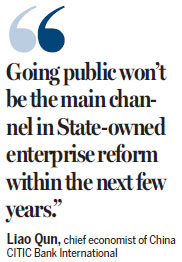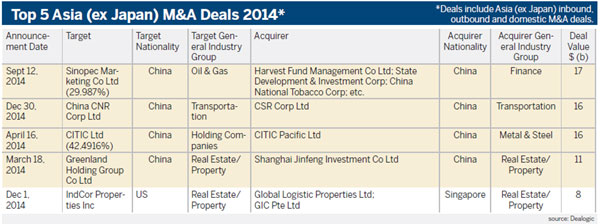Mainland SOE reform fuels M&A deals
Updated: 2015-01-24 06:35
By Gladdy Chu in Hong Kong(HK Edition)
|
|||||||||
Three of Asia's biggest merger and acquisition (M&A) deals last year arose from the restructuring of State-owned enterprises (SOEs) on the Chinese mainland, swaying investment banks' ranking in deal-making in the region, according to market data.
However, experts say they don't expect SOE reform to contribute much to investment banks' commission fees in coming years.
Compared with M&A or new shares allotment, the commission fee charged for IPO projects is the highest in investment bank division (IBD) revenue.
"IBD can charge IPO projects listed in Hong Kong's stock market up to 3 to 4 percent of the total financing volume," said a source with Merrill Lynch. "And that of bonds issue is only one-thousandth or even below that amount," the source said.
When mainland local governments set a distinct target for State-owned capital securitization in carrying out SOE reform, such as when Guangdong province changed its goal from 20 percent to 60 percent for this year, it offers a strong driving engine for investment banks' IBD revenue.
However, Liao Qun, chief economist of China CITIC Bank International, said that going public won't be the main channel in SOE reform within the next few years.
"In pursuit of diversified ownership, it's more likely for SOEs to draw into large-scale institutional investors through private placement rather than retail investors via a public offering, so that the managing right will, to some extent, be diverted to non-State-owned shareholders," he said.
"By contrast, going public won't change their nation controlling nature since retail private investors have almost no influence on corporate governance," Liao added.

Although mega mainland companies are in no hurry to get listed, investment banks will still find opportunities in SOE restructuring in 2015 - as the Financial Times reported earlier that China's $16-billion railway merger in December last year had lifted Bank of America Merrill Lynch from third to first spot in Asia's 2014 dealmaker rankings, highlighting the importance of SOEs for global players.
Data from international financial services provider Dealogic show that five out of the top 10 M&A deals in Asia (except Japan) last year were the result of SOE reform on the Chinese mainland.
If, excluding the merger between China CNR and China CSR, in which Merrill Lynch worked as one of the acquirer advisers, Merrill Lynch would have ranked third after Citi Bank and Goldman Sachs with the deal-making amount reduced to $15.6 billion.
However, market doubts whether these governmental guided deals would generate sizable credit for investment banks since it seems that strategic advice, such as traditional table negotiation of pricing, is not necessary.
"If there's a plan for going public, SOEs will need strategic advice from investment banks to help in pricing," Liao said. "But, if only M&A or new shares allotment is involved in the restructuring, most mega SOEs will have their own departments dealing with strategic decision making to do the pricing, or they might have got explicit orders from the authority."
To mainland companies which have floated in the A-share or H-share markets, it's more likely that subscribers will be found from their own network when offering new shares, which would make investment banks' commission charge poorer since they can only receive a bit of document fees.
An extreme case in December 2014 showed that Guotai Junan Securities only charged HK$100,000 for working as the placing agent for mainland private company China Dredging Environment Protection's new shares placement with Dongtai Jihua Machinery Accessories.
The placing commission only accounted for 0.04 percent of the financing volume total of HK$236 million, which is much lower than the 1.5 to 3 percent as with market practice.
United Bank of Switzerland (UBS) data showed that investment banking (IB) revenue in Asia rose by 39 percent last year to $8 billion from 2013, while Dealogic's data found that global IB revenue reached $80.6 billion in 2014 - up only 4 percent from the previous year.
UBS said on Jan 7 this year that Asia's commission expansion was due to the strength of the equity capital market (ECM) as its revenue grew by 74 percent to $4.1 billion in 2014.
The mainland's ECM volume totaled $163.9 billion in 2014, accounting for nearly 60 percent of the total in the Asia Pacific (ex Japan), while mainland M&As topped the region for 2014, accounting for 47 percent of the total volume of $307.4 billion - up 32 percent from 2013.
David Chin, head of UBS's Investment Banking Asia, believed that China's SOE reform will continue to contribute to ECM's increase in 2015 and will be the key in M&A service growth.
gladdy@chinadailyhk.com

(HK Edition 01/24/2015 page6)